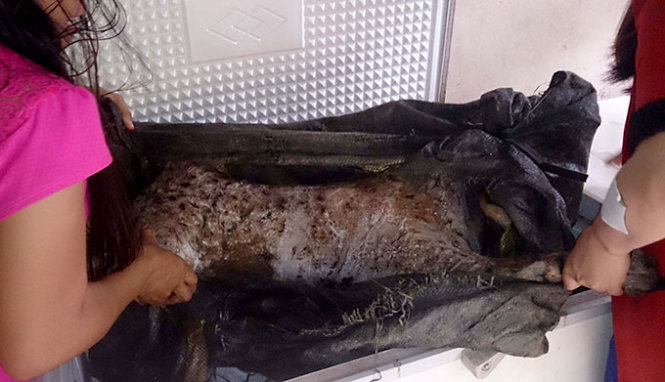A tiger trading ring exists in the northwest of Nghe An Province in central Vietnam and Tuoi Tre (Youth) newspaper journalists entered its 'headquarters' one day after disguising themselves as clients seeking qualified tiger bone glue.
The Tuoi Tre reporters met a man named B. who introduced himself as the leader of the ring and lives on the border of two communes, Nghia Thang and Nghia Hieu, in Nghia Dan District.
In his house, where the doors and windows are often closed and the interior is dimly lit, B.’s wife took the Tuoi Tre journalists deep into the house and paused at a freezer.
“This was just imported yesterday night,” she said, pointing at the body of a tiger frozen in the freezer. “Wild tigers living in the forests of Vietnam have fresher coats than tigers imported from Myanmar.”
The dead tiger lay baring its teeth in a wide mouth.
Blood poured out of its mouth when she touched its body to introduce it to her ‘clients.’
“Blood sometimes runs out of its mouth because it was just shot dead hours ago,” she added.
Then, she turned the tiger’s carcass over to show a hole in its stomach created by a bullet.
When the Tuoi Tre journalists pretended to doubt that the tiger was wild, arguing instead that it had been raised and kept in cages, she used the back of a knife and knocked at its foot, which was the size of a human fist.
It revealed sharp, neat claws.
She turned toward the journalists and said, “Hey, you go to buy a tiger but haven’t tried to understand this special item before.
“Tigers raised and kept in a cage have big, blunt claws while a wild one has claws as sharp as spikes.
“A wild tiger that weighs 30kg has fangs like this, while a similar one kept in a cage doesn’t.”
She added, “It’s not easy to have a wild tiger like this. Sometimes I import two-three animals a month, but sometimes there aren’t any for several months.
“This tiger is 28-30kg and can be yours for VND170 million [US$7,850]. No bargaining.”
She urged, “If you agree, I will ask my staff to remove the skin and begin cooking for bone glue.”
At this moment, B. appeared and reassured the Tuoi Tre journalists, “This is truly a wild tiger, hunted in Lao forests.
“A live tiger of this size costs at least VND250 million [$11,500] in the forests. If it is transported across the border, it will be around VND500-600 million [$23,000-27,700].
B. told the journalists that he is honest in his trade because the business is illegal and so dangerous.
His assets may be seized and he may be jailed, so he prefers selling the goods as quickly as possible to limit legal responsibilities.
And he urged, “So if you like it, please decide quickly.”
B. added that he could transport the animal to any province in the north for VND10 million ($462).
After slaughtering and cooking it into bone glue, it costs around VND21 million ($970) per 100 grams.
B. also advised that it is better to cook tiger bone with a small amount of bones from leopards and chamois. The kneecap of a tiger is precious for bone glue.
He said about himself, “I’ve been in this trade for 15 years and Taiwanese bosses at stone mines in Quy Hop District are my regular clients.
“I worked in the forests of Laos for over ten years and have reliable contacts with hunters there.
“We obey the law of silence,” he confirmed.
When the Tuoi Tre journalists said they wanted to buy a caged tiger at a low price, B. said he could sell two tigers each weighing around 60-70kg.
“The male tiger in a cage is 70kg and is VND750 million [$34,600]. Give me a deposit of a third of the sum, and I will bring it to your home and you will pay the remainder,” B. said.
Colonel Tran Hong, head of the environmental police department in Nghe An, said local police have uncovered some 10 cases of smuggling tigers since 2010.
Like us on Facebook or follow us on Twitter to get the latest news about Vietnam!



















































